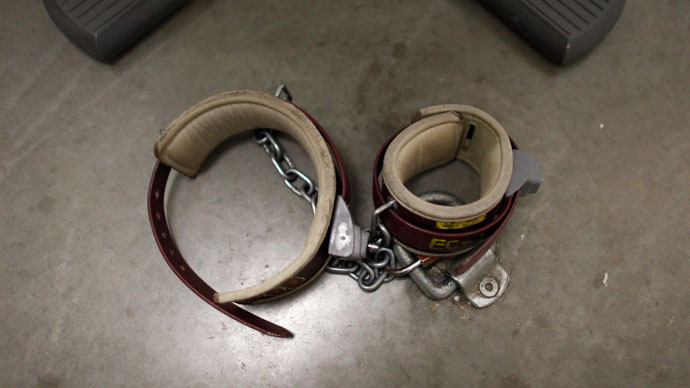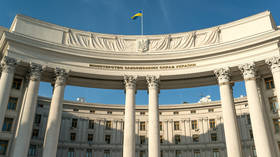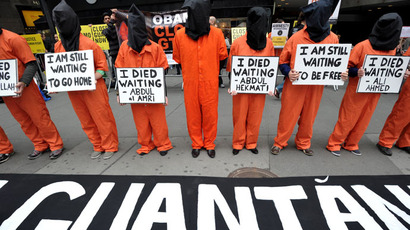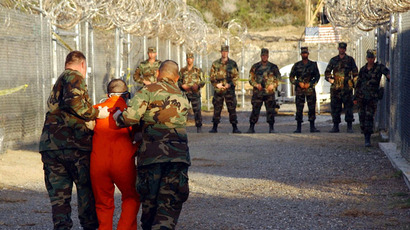'No justification' for US torturing terror suspects - 'Truth Commission' report

A leading bipartisan think-tank says it is “indisputable” that the US tortured captives in the aftermath of 9/11. The report condemned the country’s detention practices as “a grave error” using the testimonies of dozens of inmates and officials.
The 600-page document, the most comprehensive published study of
US anti-terrorist policies of the last 12 years, concluded that
there was “no justification” for torture in moral or
strategic terms, as information obtained through it was frequently
unreliable. It also noted that the behavior of the US authorities,
which includes the continuing operation of the Guantanamo detention
center, has “damaged the standing of our nation, reduced our
capacity to convey moral censure when necessary and potentially
increased the danger to US military personnel taken
captive.”
The report also calls for the closing of Camp Delta and questions
officials’ assertions about the likelihood of released captives
returning to fight against the United States.

Although many of the indictments have been aired at various points over the last decade, they have never been delivered to the public in more detail or with greater authority (an even longer Senate Intelligence Committee report on torture based on classified data has been completed, though it may or may not be made public).
The study was commission by the Constitution Project, a legal advocacy group, and jointly led by two former congressmen –Republican Asa Hutchinson, who was an Under Secretary for the department of Homeland Security during the George W. Bush administration, and James R. Jones, a Democrat and former Ambassador to Mexico.
The report asserts that “President Bush’ authorization of brutal techniques by the CIA made US personnel throughout the world believe that the “gloves are off ”, and that they could indulge in systemic “illegal” activities, “where rare exceptions [of torture] fast became the rule”. The document states that “sleep deprivation, stress positions, nudity, sensory deprivation and threatening detainees with dogs ” were used in “ many instances ” and “across many theaters ” – with witnesses describing similar techniques used in Iraq, Afghanistan and Guantanamo. Aside from waterboarding – which it alleges may have been used on a wider scale than the White House originally claimed - it also details regular use of humiliation techniques, such as leaving captives covered in their own feces for days on end.

The Constitution Project says most of those involved made the “best efforts to protect their fellow citizens ”, but “good intentions did not relieve them of their obligations to comply with existing treaties and laws. The need to respect and maintain legal and moral codes to maintain the minimum of human rights is especially great in the times of crisis”. To determine whether torture took place, the Task Force says it avoided “subjective ” criteria, but used international law and previous instances where actions were defined as torture, including times when the US condemned other countries for using the same techniques it later adopted itself. Now, the authors fear the United States has lost any moral high ground, while its deeds “aid to repressive regimes elsewhere when they seek approval or justification for their own acts.” While the testimonies pertain mostly to the years immediately after the Twin Towers attacks, the Obama administration is accused of maintaining “ongoing secrecy ” in its dealings with suspected terrorists, raising “troubling questions ”, even if it “ended the most inhumane treatment of detainees” . The report says its lack of accountability, inconsistency and an unwillingness to place a firm legal framework in its interactions with suspects, means that the now-abandoned techniques could be brought back as a result of any serious future terrorist attack on US soil.
It is even more scathing of the Obama Administration, and the Congress’ failure to shut down the Guantanamo detention camp in Cuba.

The authors call for authorities to shut down Guantanamo as early as next year, arguing that those prisoners who have been cleared, must be released, while the US mainland penal system and courts can process those who are still under suspicion.
Regarding force feeding at the Camp, which has been a regular tactic to counter hunger strikes “is a form of abuse and must end” , referring to previous ethical guidelines declared by the World Medical Association. At least 45 inmates are currently on a hunger strike in a protest against their conditions that’s lasted over two months.
In conclusion, the reports authors, who believe they are attempting the role of a “Truth Commission” that Obama failed to establish when he was elected in 2008, say that the administration has only one way to rebuild the tarnished image of the country.

“The United States has a historic and unique character, and part of that character is that we do not torture,” says the study.
"Publicly acknowledging this grave error, however belatedly,
may mitigate some of those consequences and help undo some of the
damage to our reputation at home and abroad.”














